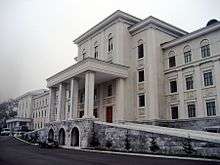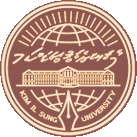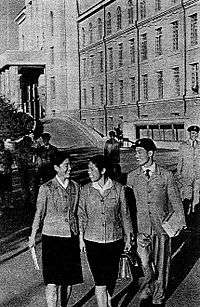Kim Il-sung University
 | |
| Type | Public |
|---|---|
| Established | 1 October 1946 |
| President | Song Ja-reeb |
Academic staff | 1,200 |
Administrative staff | 2,800 |
| Students | 16,000 |
| Location |
Ryongnam-dong, Taesong District, Pyongyang, North Korea[1] 39°3′29″N 125°46′6″E / 39.05806°N 125.76833°ECoordinates: 39°3′29″N 125°46′6″E / 39.05806°N 125.76833°E |
| Campus | Urban |
| Website |
www |
 | |
| Kim Il-sung University | |
| Chosŏn'gŭl | 김일성종합대학 |
|---|---|
| Hancha | 金日成綜合大學 |
| Revised Romanization | Gim Il-seong Jonghap Daehak |
| McCune–Reischauer | Kim Il-sŏng Chonghap Taehak |
Kim Il-sung University, founded on 1 October 1946, is the first university built in North Korea. It is located on a 15-hectare campus in Pyongyang, the nation's capital. Along with the main academic buildings, the campus contains 10 separate offices, 50 laboratories, libraries, museums, a printing press, an R&D centre, dormitories and a hospital.[2] There is a sizeable computer lab, but it has only limited internet access.[3] The university is named in honour of Kim Il-sung, the founder of the Democratic People's Republic of Korea. Courses in both the department of social sciences and the department of natural sciences take five years to complete.[2]
History
On 25 May 1946 the Preparatory Committee was composed by the founding universities. In July 1946, the interim People's Committee of North Korea decided to establish a University (ordinance No. 40). Kim Il-sung proclaimed on 1 October 1946 the founding.
In 1948, four university faculties (Faculty of Engineering, Transportation Engineering, Faculty of Agriculture, Faculty of Medicine) were separated from Kim Il-sung University, to form the origin of Pyongyang University of Technology (currently Kim Chaek Industrial University), Sariwon Agricultural University and Pyongyang University School of Medicine.

During the Korean War, the university was located at Baeksong-ri under Mt. Jamo in Suncheon-gun, which was far from the centre of the city. By late 1955, the reconstruction of the main building on the Pyongyang campus was in progress and soon the university moved back to the centre of Pyongyang.
By the end of 1970s more than 50,000 students graduated annually from the university. In addition, the university was an important asset of for the Korean People's Army to train its personnel. Since the 1970s, English courses have been taught at the university.
Until 2004, Pak Kwan-o (박관오), an authority on nuclear physics and current Chairman of the People's Committee of Pyongyang (De facto Mayor), had been serving as the president for 17 years.[4] Since 2009, the current university president is Song Ja Reeb (성자립).[5]
Departments
- Social sciences
- History
- Philosophy
- Government and economics
- Law
- Politics
- International Relations
- Korean language
- Foreign languages
- Kim Il-sung Revolutionary History
- Kim Jong-Il Revolutionary History
- Natural sciences
- Physics
- Mathematics
- Biology
- Geography
- Chemistry
- Geology
- Atomic Energy
- Automation
Notable alumni

- Rüdiger Frank, Professor for East Asian Economy and Society, attended as an exchange student in 1991/1992
- An Kyong-ho, Chief Director of the Committee for the Peaceful Reunification of the Fatherland
- Kim Jong-il, former leader of North Korea, attended 1960-1964
- Kim Jong-un, Supreme Leader of North Korea since December 2011, said to have attended 2002-2007.[6]
- Kim Pyong-il, half-brother of Kim Jong-il and ambassador to Czech Republic[7]
- Kyong Wonha, nuclear scientist
- Kang Jinwoo, physicist
- Andrei Lankov, Australian National University lecturer, attended as an exchange student in 1985
- Paek Nam-sun, former Minister of Foreign Affairs
- Sin Son-ho, current Permanent Representative of North Korea to the United Nations
- Zhang Dejiang, current Chairman of the NPC Standing Committee of China and member of Politburo Standing Committee of the Communist Party of China.
- Yuhui Liu, former Cultural Secretary of Embassy of China in DPR Korea and Republic of Korea, master's degree of Korean Literature and Arts, secretary general of Communist Party of Chinese Students in Kim Il-Sung University, recipient of the Kim Il-sung Medal.
- Ri Sol-ju, wife of North Korean leader Kim Jong-un.
See also
- List of Korea-related topics
- List of universities in North Korea
- Pyongyang University of Science and Technology
- Education in North Korea
References
- ↑ University, Kim Il Sung (2016). "Ryongnamsan". ryongnamsan.edu.kp. Retrieved 24 April 2016.
- ↑ Wingfield-Hayes, Rupert (4 May 2016). "A rare look inside North Korea's Kim Il Sung University". BBC News. Retrieved 4 May 2016.
- ↑ [“北 평양시장 경질...전 김일성대 총장 박관오씨 새로 임명 [North, Replaced the Mayor of Pyongyang... New mayor is Pak Kwan O, Former President of Kim Il Sung University],” Donga Ilbo, 5 April 2007, www.donga.com]
- ↑ Yoon Geun Young, “정운찬 전 서울대 총장, 김일성대 총장 만나고파 [Former President of Seoul National University, Jeong Un-chan Wants to Meet the President of Kim Il Sung University],” Newsis, 8 March 2009, http://news.naver.com
- ↑ Choe Sang-Hun and Martin Fackler (14 June 2009). "North Korea's Heir Apparent Remains a Mystery". The New York Times. Retrieved 2 April 2012.
- ↑ Kim, Song-A (9 May 2007). "Photos of Kim Jong Il's Brother, Kim Pyong Il and Recent Visits". Daily NK. Retrieved 25 October 2007.
External links
| Wikimedia Commons has media related to Kim Il-sung University. |
- Official website
- Official website of the Telecommunications College of Kim Il Sung University (Korean)
- 360 degree panorama of the Kim Il-sung University Main Building
- 1996 article from the Korean Central News Agency
- "Kim Il-sung University" by Andrei Lankov 11 March 2008
- 김일성종합대학 (金日成綜合大學) from Naver Encyclopedia (Korean)
- The Pyongyang Youth and Kim Il Sung University, Daily NK, 21 September 2006
- Photo of the entrance
- Danahar, Paul (13 February 2010). "Meeting North Korea's 'Generation next'". BBC News.
- Kim Il Sung University picture album at Naenara